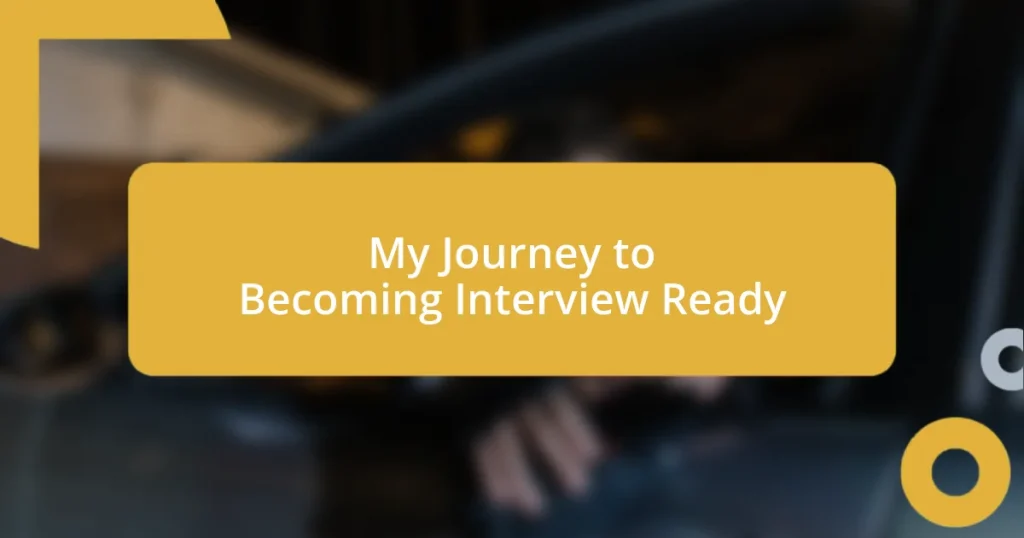Key takeaways:
- Preparation is crucial for interviews; understanding the company culture and showcasing your alignment with their values can create a genuine connection.
- Setting clear, meaningful career goals using the SMART framework is essential for maintaining motivation and guiding personal and professional development.
- Following up after interviews, such as sending a thank-you note and maintaining communication, can enhance your candidacy and demonstrate genuine interest in the position.

Understanding the Interview Process
The interview process can feel like a complex maze at times, especially when you realize it’s not just about answering questions. I remember preparing for one interview where I felt like my heart raced faster than the questions fired at me. I wondered—how do I make a genuine connection while showcasing my skills? Each interviewer has their own style, and the trick is to adapt while staying true to yourself.
I’ve learned that preparation is key, but it goes beyond rehearsing answers; it’s about understanding the company and its culture. For instance, I researched a company thoroughly before my last interview, digging into their values and mission. This paid off when I was able to weave in my personal experiences that aligned with what they stood for, almost as if we were having a conversation rather than a formal interview.
It’s also important to remember that interviews are a two-way street. While you’re being assessed, you’re also evaluating if this is the right fit for you. During one interview, I found the questions leaned heavily towards assessing my adaptability, and it got me thinking—did I truly want to work under such pressure? Reflecting on questions like this can be crucial in guiding your decision-making process throughout your career.

Setting Career Goals
Setting career goals is like charting a course through uncharted waters. I remember when I first set my sights on a managerial position; it felt daunting yet thrilling. I took a moment to jot down my aspirations, ensuring they were specific, measurable, achievable, relevant, and time-bound (often referred to as SMART goals). This clarity transformed my ambitions into actionable steps, guiding my decisions and efforts daily.
As I honed my skills over the years, I found that my goals evolved. At one point, I aimed for a senior role within five years. Yet, as I gained experiences and insights, the importance of continuous learning became evident to me. I began to include development goals alongside career advancement, realizing that personal growth contributes significantly to professional success.
Having a tangible goal can ignite motivation, but it’s your passion that fuels perseverance. I recall working late on a project that seemed never-ending, but the thought of reaching my career goal kept me focused. This emotional connection to my aspirations sustained me through challenging days and inspired me to seek help when needed. Setting meaningful career goals is not just about the destination; it’s about enjoying the journey and the growth that comes with it.
| Career Goal Characteristics | Importance |
|---|---|
| Specific | Helps to clarify what you want to achieve |
| Measurable | Allows you to track progress |
| Achievable | Ensures you set realistic and attainable goals |
| Relevant | Keeps you aligned with your passions and values |
| Time-bound | Creates urgency and aids in accountability |

Building Essential Skills
Building essential skills is a journey I truly enjoy. I recall a moment during my professional development when I decided to take a public speaking course. Initially, the thought made my palms sweat. But as I practiced and gradually improved, I learned not just to speak but to connect with my audience. These skills became invaluable during interviews, where articulating my thoughts clearly and confidently set me apart from other candidates.
To effectively build skills for interviewing and beyond, focus on these key areas:
- Communication: Practice conveying your thoughts efficiently and authentically. Consider joining groups like Toastmasters for structured feedback.
- Problem-solving: Engage in activities that challenge your analytical thinking, like puzzles or coding exercises.
- Networking: Build relationships in your industry. Attend events and engage on platforms like LinkedIn to learn from others.
- Research: Develop the ability to gather and synthesize information. This skill helps you prepare tailored responses for each interview scenario.
- Emotional Intelligence: Work on recognizing and managing your emotions, which empowers you to navigate stressful situations more effectively.
Investing time in these areas not only positions you for success in interviews but also in your overall career. Each interaction becomes an opportunity to refine your skills, leading to continuous growth.

Crafting Your Personal Brand
Crafting your personal brand isn’t just about what you want to communicate; it’s about how you want to be perceived. I remember when I first realized the power of personal branding during an industry workshop. The facilitator had us create a personal brand statement, and I found myself truly reflecting on who I was and what I stood for. I had to ask myself: What unique strengths do I offer? This introspection not only shaped my narrative but also empowered me to present my authentic self in every interaction, including job interviews.
One practical step I took was to build an online presence that aligned with my brand. I started sharing insights related to my field on platforms like LinkedIn. I was nervous at first; how would people respond? But with each post, I saw how sharing my thoughts allowed my personality and expertise to shine through. It became less about self-promotion and more about contributing to conversations that mattered. This shift transformed my confidence and helped me connect with like-minded professionals who appreciated my perspectives.
Finally, consider the role of visuals in your personal brand. I once attended a networking event where several people were dressed similarly, but one individual stood out with a distinctive style reflective of their personality. This made me think about how much our appearance communicates. I began choosing outfits that felt true to who I am, allowing me to present not just my skills but my essence. Have you thought about what your personal style says about you? Establishing a strong personal brand is all about coherence; it’s a blend of what you say, how you act, and the image you project.

Preparing Your Resume Effectively
When it comes to preparing your resume effectively, I always start with the story my resume tells. I remember when I revamped mine after a particularly challenging job search. I took time to analyze the roles I was applying for and made sure every experience highlighted relevant skills and accomplishments. It’s amazing how tweaking a bullet point can significantly change the reader’s perception. Does your resume reflect the impact you’ve made in previous positions or merely list duties?
Another crucial aspect I can’t stress enough is tailoring your resume for each application. One time, I applied for a project manager position and realized I needed to emphasize my leadership in past projects over my technical skills. I crafted a summary that spoke directly to the values and needs of the company, which ultimately made a huge difference. Have you considered how well your resume speaks to the specific job you’re aiming for?
Lastly, don’t underestimate the power of formatting. I learned this the hard way — an earlier version of my resume looked cluttered and felt overwhelming. By adopting a clean layout and using bullet points for clarity, I let my experiences breathe. It not only looked more professional but also made it easier for hiring managers to digest the information quickly. What visual choices have you made in your resume that could be improved? Remember, a polished resume is like an inviting cover; it should captivate the reader’s attention at first glance.

Practicing Common Interview Questions
Practicing common interview questions is an essential part of preparing for any job opportunity. I recall sitting in front of my mirror, rehearsing answers to questions like “Tell me about yourself” and “What are your greatest strengths?” It felt silly at first, but as I verbalized my responses, I noticed that I not only became more comfortable but also began to articulate my thoughts with clarity. Have you ever practiced in front of a mirror? It’s a game changer!
One of my favorite strategies involves role-playing with a friend. The first time I tried this, my friend asked me questions I hadn’t even considered, like “How do you handle conflict?” The experience was eye-opening. I stumbled through some answers at first, but with every attempt, I refined my responses. This interactive practice made me realize the importance of being prepared for the unexpected. When was the last time you pushed your boundaries in practice?
I also recommend recording yourself while answering interview questions. My first attempt was a bit cringe-worthy—I couldn’t believe how rapidly I was speaking! However, this exercise helped me recognize areas I wanted to improve, like pacing and tone. It’s rewarding to see your progress over time. Have you ever considered how recording your practice sessions could elevate your interview preparedness? Embracing this kind of self-assessment can truly transform how you approach those crucial conversations.

Following Up After Interviews
Following up after interviews is a step that can really set you apart from other candidates. I learned this the hard way after missing out on a job I really wanted because I failed to send a thank-you note. It might seem small, but a simple message expressing gratitude for the opportunity can keep you fresh in the interviewer’s mind. Have you ever considered how just a few sentences can show your interest in the position?
In my experience, timing is everything when it comes to follow-ups. I typically send a brief email within 24 hours of the interview, referencing a specific conversation point. For instance, after one interview, I mentioned a shared passion for community service that came up during our discussion. This not only personalized my message but also made it memorable. Don’t you think a timely follow-up can reinforce your enthusiasm for the role?
Lastly, don’t hesitate to follow up again if you haven’t received a response after a week or so. I once reached out to inquire about the hiring timeline after an interview and was pleasantly surprised to receive valuable feedback. It showed my persistent interest and willingness to stay engaged in the process. How might proactive communication work in your favor during job searches?















